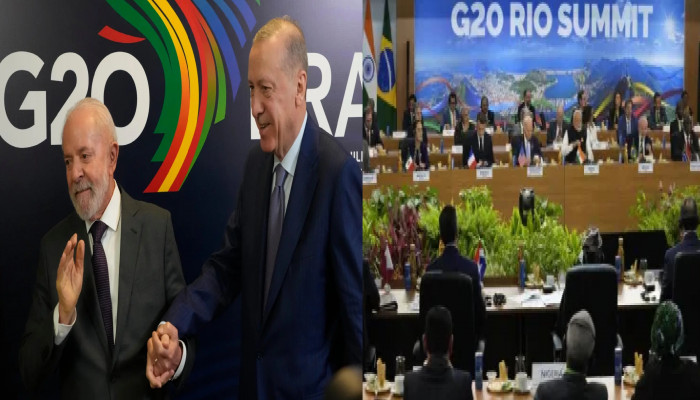Short on specifics, Brazil G20 Summit leads global push against hunger, inequality, climate crisis
- In Reports
- 02:25 PM, Nov 19, 2024
- Myind Staff
The Group of 20 summit in Rio de Janeiro concluded on Monday with a joint declaration that, despite not receiving full support from all members, successfully tackled most of the key issues that host Brazil had emphasised. These included the two ongoing major wars, a global pact to combat hunger, the taxation of the wealthiest individuals, and reforms to global governance.
Experts had expressed scepticism about Brazil's President Luiz Inacio Lula da Silva's ability to persuade the assembled leaders to reach an agreement, given the uncertainty surrounding the incoming administration of US President-elect Donald Trump and the escalating global tensions due to the conflicts in Ukraine and the Middle East. The chances of a consensus were further diminished when Argentina's negotiators disputed parts of the draft language and ultimately chose not to fully endorse the document.
"Although generic, it is a positive surprise for Brazil," stated Thomas Traumann, an independent political consultant and former Brazilian minister. "There was a moment when there was a risk of no declaration at all. Despite the caveats, it is a good result for Lula." The militant group Hamas attacked Israel on October 7, 2023, one month after the G20 Summit last year. The attack was condemned and appeals for peace were made, but no blame was placed. Israel's campaign of retaliation, which has killed over 43,000 Palestinians in Gaza, according to local health officials, and over 3,500 people in Lebanon in Israel's offensive against Hezbollah, according to Lebanon's Health Ministry, made it unclear how this year's statement might be interpreted.
The "catastrophic humanitarian situation in Gaza and the escalation in Lebanon" were mentioned in the G20 declaration, which also emphasised the pressing need to provide humanitarian aid and strengthen civilian protection. "Affirming the Palestinian right to self-determination, we reiterate our unwavering commitment to the vision of the two-state solution where Israel and a Palestinian State live side by side in peace," it said. However, it said nothing about the suffering of Israel or the approximately 100 hostages still held captive by Hamas. The G20 does not include Israel. US President Joe Biden's steadfast support of Israel's right to self-defence seemed to contradict that lack of recognition.
News dominated by President Biden's decision to relax restrictions on Ukraine’s use of longer-range US missiles, enabling the country to target deeper inside Russian territory. The most notable absence at the summit was Russian President Vladimir Putin. The International Criminal Court has issued a warrant for his arrest, compelling member states to detain him, and in his place, Russian Foreign Minister Sergey Lavrov attended. The G20 declaration underscored the human toll of the war in Ukraine while calling for peace, though it refrained from specifically naming Russia.
"The declaration avoids pointing the finger at the culprits," said Paulo Velasco, an international relations professor at the State University of Rio de Janeiro. "That is, it doesn't make any critical mention of Israel or Russia, but it highlights the dramatic humanitarian situations in both cases." Ministers and negotiators met in working groups prior to the G20 to debate Brazil's plan to impose a 2 per cent income tax on billionaires. At the beginning of the afternoon session for the leaders, Lula repeated his call for the tax. Despite initial uncertainty, this request made it into the final declaration. According to officials from both Brazil and another G20 country, Argentine negotiators strongly opposed this clause—one they had initially agreed to in July—as well as another clause advocating for gender equality.
Argentina signed the G20 declaration, but expressed partial dissent on certain points, as stated in an announcement on X. This included disagreements with aspects related to the UN's 2030 sustainable development agenda, which right-wing President Javier Milei has criticised as "a supranational programme of a socialist nature." The country also objected to proposals on regulating hate speech on social media, actions by global bodies like the UN that Milei sees as an infringement on national sovereignty, and the notion that greater state intervention is the solution to hunger.
A significant portion of the declaration highlights the goal of eliminating hunger, a key priority for President Lula. Brazil's government had previously emphasised that the launch of the global alliance against hunger and poverty by Lula on Monday was just as crucial as the final declaration itself. As of that day, 82 countries had signed onto the initiative, according to Brazil’s government. On Sunday, a demonstration on Rio’s Copacabana beach displayed 733 empty plates across the sand, symbolising the 733 million people who experienced hunger in 2023, based on United Nations data. The demonstration called on world leaders to take action. The G20 presidency was used by Brazil "to respond to people's demands worldwide to tackle extreme inequality, hunger, and climate breakdown, and particularly for rallying action on taxing the super-rich," according to Viviana Santiago, a director at Oxfam, a nonprofit organization that fights poverty.
A commitment to "transformative reform" of the UN Security Council was made by the leaders. "We call for an enlarged Security Council composition that improves the representation of the underrepresented and unrepresented regions and groups, such as Africa, Asia-Pacific and Latin America and the Caribbean," the statement read.







Comments